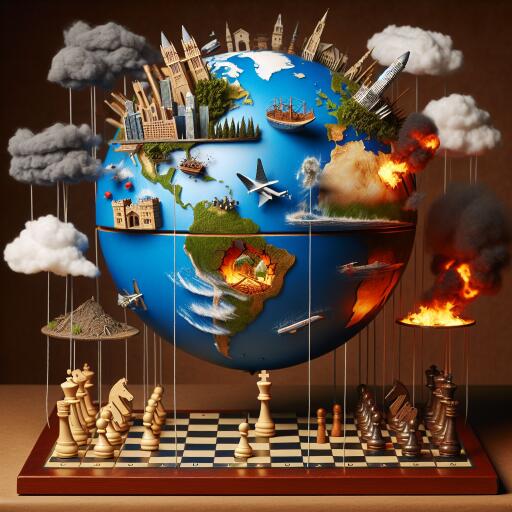
Global Challenges: Climate Change, Conflict, and the Illusion of Diplomacy
In a world increasingly defined by urgent environmental crises and geopolitical tensions, climate change stands out not just as a topic of global discussion but as a looming existential threat. The evidence of climate change’s devastating impact surrounds us, manifesting through extreme weather patterns, environmental degradation, and a host of alarming signs that underscore the urgency for a united, decisive response.
The wide-reaching consequences of climate change are well-documented, from direct effects like catastrophic storms and severe droughts to secondary repercussions such as water scarcity, agricultural disruption, and energy shortages. These issues are further exacerbated by environmental challenges including deforestation, glacier retreat, and the rising levels of our oceans. Together, they set the stage for mass migrations, social unrest, and a myriad of governance challenges that transcend national borders.
Despite the international community’s engagement, with 194 United Nations member states discussing climate measures, the efforts have so far fallen short of producing significant outcomes. High-level talks and agreements often seem more symbolic than effective, with environmental priorities frequently undercut by economic and political interests driven by a relentless pursuit of growth and profit.
The crux of the climate dilemma poses several critical questions: What are the primary drivers of this crisis? Who holds accountability, and what steps can we collectively take to avert the direst outcomes? The debate challenges us to reconceptualize our commitment to sustainability against the forces of industrial and technological expansion, often propelled by human greed rather than need.
In the international arena, while the Paris Agreement of 2015 marked a historic moment of acknowledgment and resolve against climate change, the reality of its implementation reveals a stark and sobering challenge. Ecosystems around the globe, from the polar ice caps to the Amazon rainforest, are under siege by developmental aggression driven by a few at the expense of many. This relentless exploitation of the planet’s resources is starkly evident in the arms industry, where the pursuit of profit trumps environmental and human health, fueling conflicts that ravage societies and ecosystems alike.
Increasing recognition of military activities’ environmental toll has prompted some discussions on reducing armed forces’ carbon footprints. Yet, these discussions often feel more hypothetical than practical, a distant goal rather than an immediate plan of action. Meanwhile, the labyrinth of international diplomacy, with its myriad of agreements on arms control and security cooperation, seems to offer little more than a façade of commitment, as the arms trade and geopolitical conflicts continue unabated, exacerbating the climate crisis and undermining global stability.
Examining contemporary conflicts such as the prolonged strife in Ukraine or the enduring tensions in the Levant offers a clear lens on the environmental and humanitarian catastrophes that result from these confrontations. The repercussions extend far beyond the immediate zones of conflict, threatening broader ecological and social collapse. Yet, despite the clear and present danger, global efforts to address climate change in the context of these conflicts seem paralyzed by inaction and political inertia.
The stark reality is that the mechanisms and agreements designed to foster peace and environmental stewardship often fail to match their ambitions with tangible results. This global governance failure calls into question the efficacy of current approaches to climate change and conflict resolution. The persistent prioritization of economic and military interests over environmental stability and human welfare suggests a troubling prognosis for global efforts to combat climate change.
In the face of such challenges, the future appears uncertain. The need for comprehensive, effective action has never been more urgent, yet the path forward is obstructed by competing interests and a lack of genuine political will. As environmental degradation and geopolitical conflicts continue to intersect, the question remains: who will lead the charge in redefining priorities to avert a catastrophic future for humanity and the planet?
The global community stands at a crossroads, with the choices made today shaping the legacy of tomorrow. It is time for a radical rethinking of how we address the intertwined challenges of climate change and conflict, moving beyond diplomatic platitudes towards meaningful, concerted action. Only then can we hope to preserve the planet for future generations, ensuring a legacy of stewardship over destruction.





Leave a Reply